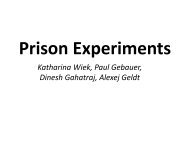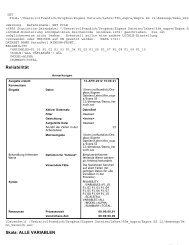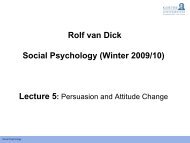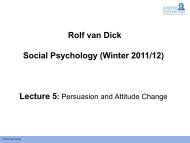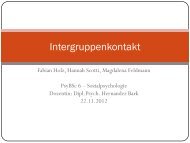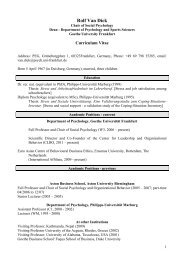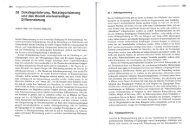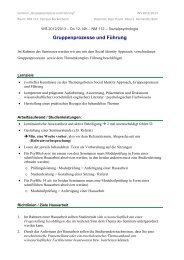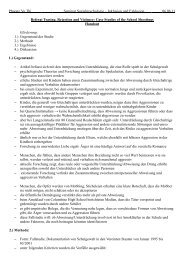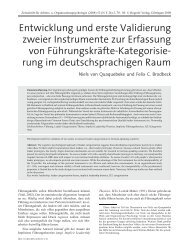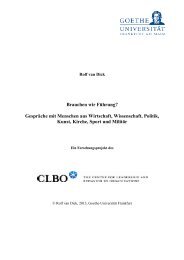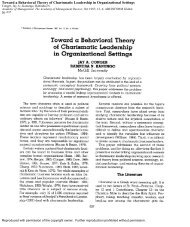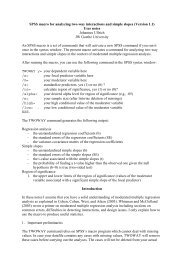Social Identity Theory and Self-categorization Theory: A Historical ...
Social Identity Theory and Self-categorization Theory: A Historical ...
Social Identity Theory and Self-categorization Theory: A Historical ...
Create successful ePaper yourself
Turn your PDF publications into a flip-book with our unique Google optimized e-Paper software.
218 <strong>Social</strong> <strong>Identity</strong> <strong>Theory</strong> <strong>and</strong> <strong>Self</strong>-<strong>categorization</strong> <strong>Theory</strong><br />
Short Biography<br />
Matthew Hornsey completed his PhD in 1999 at the University of<br />
Queensl<strong>and</strong>, Australia, <strong>and</strong> is currently a senior lecturer at the University<br />
of Queensl<strong>and</strong>. His work – which is published in journals such as<br />
Personality <strong>and</strong> <strong>Social</strong> Psychology Review, Personality <strong>and</strong> <strong>Social</strong> Psychology<br />
Bulletin, <strong>and</strong> Journal of Experimental <strong>Social</strong> Psychology – examines topics<br />
related to group processes <strong>and</strong> intergroup relations, much of it from a<br />
social identity perspective. His early research comprised an empirical<br />
rebuttal of assimilationist theories of intergroup relations that had<br />
dominated the literature in the 1990s. Recently, the focus of his research<br />
has been on examining the conditions under which group members are<br />
willing to challenge the status quo, <strong>and</strong> the conditions that affect the<br />
likelihood of such efforts succeeding. This research includes a systematic<br />
attempt to test <strong>and</strong> theorise about how identity issues influence responses<br />
to internal <strong>and</strong> external criticism of groups.<br />
Endnotes<br />
* Correspondence address: School of Psychology, University of Queensl<strong>and</strong>, St Lucia,<br />
Queensl<strong>and</strong> 4072, Australia. Email: m.hornsey@uq.edu.au<br />
1<br />
It should be noted that Marilynn Brewer was a pivotal figure in focusing North American<br />
interest on social identity theory. Her Psychological Bulletin (1979) article examining the cognitive<br />
<strong>and</strong> motivational bases for intergroup bias has been the entry point for many North American<br />
researchers interested in social identity theory. At the time of writing, it has been cited over<br />
780 times (according to ISI).<br />
2 As a crude demonstration of the exponential growth in impact of the social identity approach,<br />
I searched PsycInfo to see how many times the terms ‘social identity theory’ or ‘self-<strong>categorization</strong><br />
theory’ appeared in each of three years: 1986, 1996, 2006. The numbers I cite here refer to<br />
the number of publications in that particular year (it is not a cumulative figure). In 1986, 11<br />
publications made reference to one or both of the theories. In 1996, this had increased to 47,<br />
<strong>and</strong> by 2006 it had jumped to 568.<br />
3 Researchers in the field did not rally around the label ‘social identity theory’ until the early<br />
1980s; in earlier work, there was a reluctance to give a label to the ideas. Where reference was<br />
made to the constellation of ideas as a single entity, it was referred to variously as ‘identity<br />
theory’, ‘social identity/social comparison theory’, or ‘a theory of social identity’.<br />
4<br />
This emphasis on social change partly reflected the influence of Marxist philosophy on British<br />
academia in the 1960s <strong>and</strong> 1970s.<br />
References<br />
Abrams, D., & Hogg, M. A. (2004). Metatheory: Lessons from social identity research. Personality<br />
<strong>and</strong> <strong>Social</strong> Psychology Review, 8, 98–106.<br />
Abrams, D., Marques, J. M., Bown, N. J., & Henson, M. (2000). Pro-norm <strong>and</strong> anti-norm<br />
deviance within in-groups <strong>and</strong> out-groups. Journal of Personality <strong>and</strong> <strong>Social</strong> Psychology, 78,<br />
906–912.<br />
Adorno, T. W., Fenkel-Brunswik, E., Levinson, D. J., & Stanford, R. N. (1950). The authoritarian<br />
personality. New York: Harper.<br />
Ashforth, B. E., & Mael, F. (1989). <strong>Social</strong> identity theory <strong>and</strong> the organization. Academy of<br />
Management Review, 14, 20–39.<br />
© 2008 The Author <strong>Social</strong> <strong>and</strong> Personality Psychology Compass 2/1 (2008): 204–222, 10.1111/j.1751-9004.2007.00066.x<br />
Journal Compilation © 2008 Blackwell Publishing Ltd



